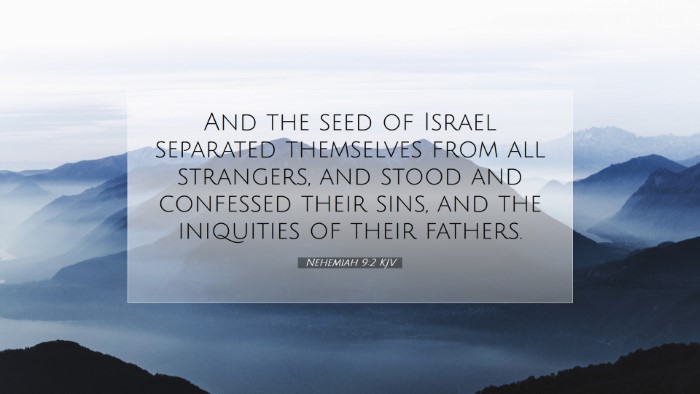Commentary on Nehemiah 9:2
Nehemiah 9:2 states, "And the seed of Israel separated themselves from all strangers, and stood and confessed their sins, and the iniquities of their fathers." This verse is pivotal in the narrative of the restoration of Israel, reflecting both a communal and personal acknowledgment of sin and a desire to return to faithfulness before God.
Exegesis and Context
The passage occurs in a significant moment after the returning exiles had settled back in Jerusalem. The people are coming together to worship and recount their history, which includes both God's faithfulness and their collective failures.
- Historical Background: The context of Nehemiah's leadership and the rebuilding project establishes a renewed community identity. The cry for separation from “all strangers” serves to highlight the necessity of purity and dedication to God.
- Liturgical Setting: This gathering suggests a communal act of repentance, signifying a collective understanding of the need for restoration.
Spiritual Significance
The act of separating from strangers indicates a move toward holiness and commitment. This separation is not merely physical but signifies a deeper spiritual distinction from practices and influences that led them astray.
- Confession: The confession of sins suggests a profound recognition of personal and corporate shortcomings. It aligns closely with the biblical principle of repentance where acknowledgment precedes healing.
- The Iniquities of Their Fathers: This phrase reflects the communal nature of sin; the people are aware that their current state has roots in the disobedience of previous generations, leading to a rich theological discourse on corporate identity in sin and redemption.
Insights from Public Domain Commentaries
Matthew Henry
Henry emphasizes the importance of the people’s deliberate act to separate. He notes that true repentance requires an inner transformation complemented by outward actions. He suggests that the separation from strangers illustrates the necessity for God's people to not only repent but also to actively distance themselves from influences that undermine their covenant relationship with God.
Albert Barnes
Barnes highlights the twofold nature of the act in this verse: the separation from outsiders and the confession of sin. He draws attention to the implications of standing publicly to confess sins, which can cultivate accountability within the community. Barnes notes that such public acts are vital in rebuilding a shared identity under God’s law.
Adam Clarke
Clarke discusses the notion of confessing the "iniquities of their fathers," arguing that awareness of history plays a significant role in current faith practice. He identifies this acknowledgment as a pathway to understanding the grace offered by God, recognizing that while the legacy of sin affects the community, it does not preclude them from receiving mercy.
Application for Today
The content of Nehemiah 9:2 serves as a foundational text for churches today, encouraging a community engaged in honesty about their collective sins as well as a commitment to spiritual renewal. Pastors and scholars might consider the following applications:
- Community Repentance: Creating spaces within congregations where confession can occur, fostering a spirit of unity and healing.
- Education on Holiness: Teaching the distinction of being God's people in a diverse society and the importance of maintaining integrity in faith.
- Legacy Awareness: Helping congregations grapple with their historical roots while navigating present-day challenges in faith.
Conclusion
In Nehemiah 9:2, we find a profound call for separation, confession, and a return to God that echoes throughout Scripture. This passage provides rich material for reflection on identity, community roles in repentance, and the ongoing need for grace. The insights from various commentators deepen our understanding and challenge us towards action. May this verse encourage both individuals and communities to engage in the sacred act of renewal and to seek God’s face with sincerity and humility.


